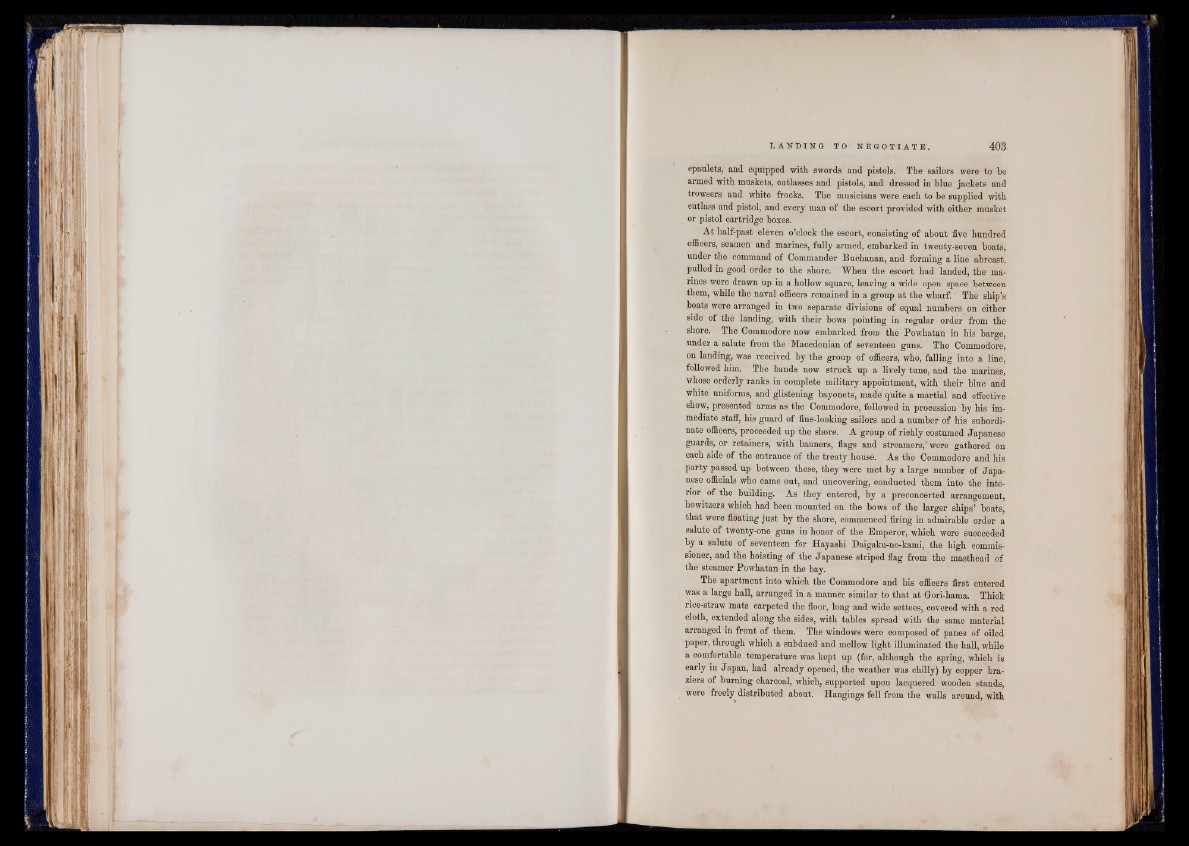
epaulets, and equipped with swords and pistols. The sailors were to be
armed with muskets, outlasses and pistols, and dressed in blue jackets and
trowsers and white frocks. The musicians were each to be supplied with
cutlass and pistol, and every man of the escort provided with either musket
or pistol cartridge boxes.
At half-past eleven o’clock the escort, consisting of about five hundred
officers, seamen and marines, fully armed, embarked in twenty-seven boats,
under the command of Commander Buchanan, and forming a line abreast,
pulled in good order to the shore. When the escort had landed, the marines
were drawn up in a hollow square, leaving a wide open space between
them, while the naval officers remained in a group at the wharf. The ship’s
boats were arranged in two separate divisions of equal numbers on either
side of the landing, with their bows pointing in regular order from the
shore. The Commodore now embarked from the Powhatan in his barge,
under a salute from the Macedonian of seventeen guns. The Commodore,
on landing, was received by the group of officers, who, falling into a line,
followed him. The bands now struck up a lively tune, and the marines,
whose orderly ranks in complete military appointment, with their blue and
white uniforms, and glistening bayonets, made quite a martial and effective
show, presented arms as the Commodore, followed in procession by his immediate
staff, his guard of fine-looking sailors and a number of his subordinate
officers, proceeded up the shore. A group of richly costumed Japanese
guards, or retainers, with banners, flags and streamers," were gathered on
each side of the entrance of the treaty houBe. As the Commodore and his
party passed up between these, they were met by a large number of Japanese
officials who came out, and uncovering, conducted them into the interior
of the building. As they entered, by a preconcerted arrangement,
howitzers which had been mounted on the bows of the larger ships’ boats,
that were floating just by the shore, commenced firing in admirable order a
salute of twenty-one guns in honor of the Emperor, which were succeeded
by a salute of seventeen for Hayashi Daigaku-no-kami, the high commissioner,
and the hoisting of the Japanese striped flag from the masthead of
the steamer Powhatan in the bay.
The apartment into which the Commodore and his officers first entered
was a large hall, arranged in a manner similar to that at Gori-hama. Thick
rice-straw mats carpeted the floor, long and wide settees, covered with a red
cloth, extended along the sides, with tables spread with the same material
arranged in front of them. The windows were composed of panes of oiled
paper, through which a subdued and mellow light illuminated the hall, while
a comfortable temperature was kept up (for, although the spring, which is
early in Japan, had already opened, the weather was chilly) by copper braziers
of burning charcoal, which, supported upon lacquered wooden stands,
were freely^ distributed about. Hangings fell from the walls around, with